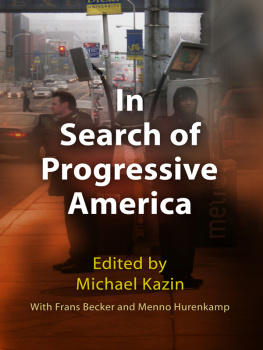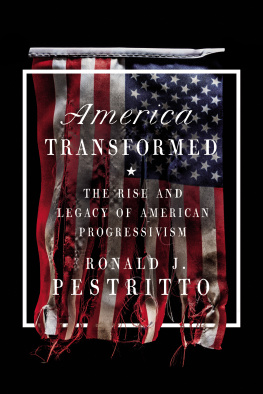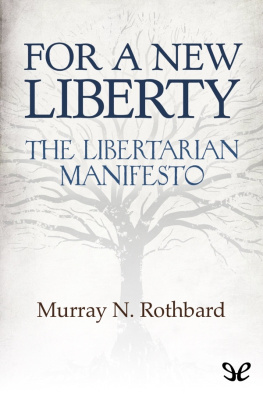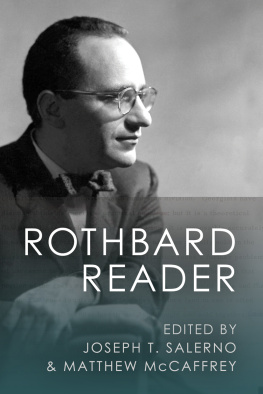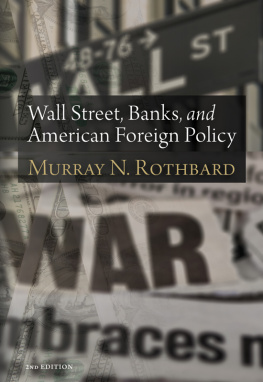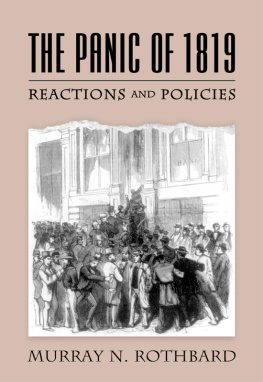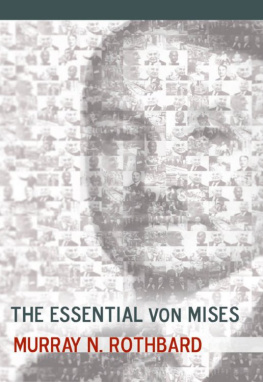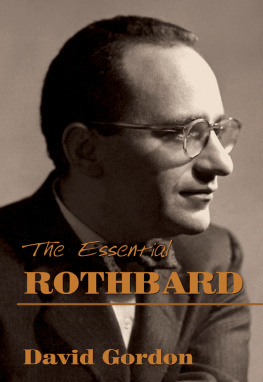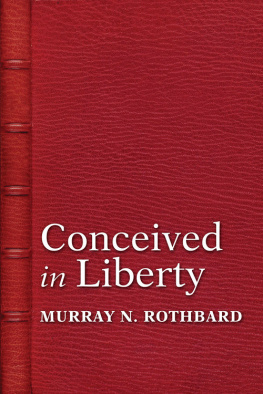The Progressive Era
Murray N. Rothbard
Edited by
Patrick Newman
Foreword by
Judge Andrew P. Napolitano
The Mises Institute dedicates this volume to all of its generous Supporters and wishes to thank these, in particular:
Benefactors
Mr. and Mrs. Donald M. Rembert, Sr., Steven R. Berger
Mr. and Mrs. Gary J. Turpanjian, Juliana and Hunter Hastings
Ryan Schmitt in Memory of William Norman Grigg
Yousif Almoayyed and Budoor Kazim
Patrons
Anonymous, Behfar and Peiying Bastani in honor of those known and
unknown who fight for liberty, Wayne Chapeskie, Carl S. Creager
Thomas and Lisa Dierl, Reza Ektefaie, Willard and Donna Fischer
Kevin R. Griffin, Jeff and Jamie Haenggi, Jule R. Herbert, Jr.
Albert L. Hillman, Jr., Hunter Lewis and Elizabeth Sidamon-Eristoff
Arnold Lisio, MD in Memory of Margit von Mises, Arthur L. Loeb
David McClain, Joseph Edward Paul Melville, Michael L. Merritt
Gregory and Joy Morin, James Nardulli, Chris and Melodie Rufer, Leif Smith
Dr. Thomas L. Wenck, Brian J. Wilton, Walter and Sharon Woodul III
Donors
Anonymous, Wesley and Terri Alexander
Thomas T. Amlie making amends for grandfather Thomas Ryum Amlie
William H. Anderson, John Bartel, Dr. Thomas Beazlie, Ryan Best
Bob and Rita Bost, Rmi Boudreau, John Boyer, Michael L. Burks
John L. Buttolph III, Prof. Paul Cantor, Terence Corcoran, Jim and Cherie Cox
Randall Dollahon and Kathleen Lacey, Jeffery M. Doty, Prof. Frank van Dun
Bill Eaton, David J. Emery, Eric Englund, John Rock Foster
Dietmar Georg, Christopher Georgacas, Kevin Paul Hamilton
Charles F. Hanes, Sheldon Hayer, Wilfrid Helms, Dr. Frederic Herman
Adam W. Hogan, Greg E. Hood, Andrew C. Irvin, Eric N. Johnson
Samuel J. Kain, Brett Keiser, Stephan and Cindy Kinsella, Mitchell Lawhorn
Joseph Matarese, Brian E. Millsap, Ali Reza M., R. Nelson and Mary Nash
Andrew Packer, Paul F. Peppard, Alan Reynolds, Peter A. Roof
Patrick Rosenwald, Dr. Murray Sabrin, Thad and Cyndy Salmon
Dr. John H. Scacchia, John L. Schroeder, Butler and Jane Shaffer, John P. Sharkey
Henri Etel Skinner, Mr. and Mrs. Dennis A. Sperduto, Steve Theodorou
Richard Timberger, Pavel Tolkachev, Mitchell A. Vanya, Mark Walker
J. Stanley Warford, Alice and Wayne Whitmore
Rich and Janny Wilcke in loving memory of their sons Billy and Benny
Edgar H. Williams, William B. Zieburtz, Jr.

Mises Institute , founded in 1982, is a teaching and research center for the study of Austrian economics, libertarian and classical liberal political theory, and peaceful international relations. In support of the school of thought represented by Ludwig von Mises, Murray N. Rothbard, Henry Hazlitt, and F.A. Hayek, we publish books and journals, sponsor student and professional conferences, and provide online education. Mises.org is a vast resource of free material for anyone in the world interested in these ideas. For we seek a radical shift in the intellectual climate, away from statism and toward a private property order.
For more information, see , or phone us at 1.800.OF.MISES.
Mises Institute
518 West Magnolia Avenue
Auburn, Alabama 36832
Published 2017 by the Mises Institute. This work is licensed under a Creative Commons Attribution-NonCommercial-NoDerivs 4.0 International License. http://creativecommons.org/licenses/by-nc-nd/4.0/
Mises Institute
518 West Magnolia Ave.
Auburn, Ala. 36832
mises.org
paperback edition: 978-1-61016-674-4
large print edition: 978-1-61016-675-1
epub: 978-1-61016-677-5
Contents
Foreword
W hen I was in my junior and senior years at Princeton studying history in the early 1970s, I became fascinated with the Progressive Era. It attracted me at a time when America rejected as profoundly as it did under Lincoln and the Radical Republicans and even under FDR, the libertarian first principles of the American Revolution.
To pursue this interest, I volunteered to take a course in the Graduate School, a procedure permitted for a few undergraduates at the time. The course was an advanced look at Progressive intellectual thought taught by Woodrow Wilsons biographer and hagiographer, Professor Arthur S. Link. The readings were all pro-Progressive as were all the other students in the class. We studied Professor Links works and the claptrap by his colleague William E. Leuchtenberg.
In my search for a rational understanding of the Eraand for ammunition to use in the classroom where I was regularly beaten upI asked Professor Link if any academic had made the argument effectively that the Progressives were power-hungry charlatans in the guise of noble businessmen, selfless politicians, and honest academics.
He told me of a young fellow named Rothbard, of whose work he had only heard, but had not read. This advice sent me to Man, Economy, and State, which I devoured; and my ideological odyssey was off to the races.
Like many of Rothbards student admirers, I also devoured For a New Liberty, all four volumes of Conceived in Liberty, and The Mystery of Banking. As any student of human freedom in general or of the Austrian school specifically, knows, these must-reads are all a joy to read. And we also know that in those works and others, Rothbard established himself as the great interpreter of Ludwig von Mises.
While he was writing those books and lecturing nationally and producing many ground-breaking articles and essays on human freedom, he began to write discrete chapters of a book he would not live to publish on the Progressive Era.
One of his great young interpreters, Florida Southern College professor and Mises Fellow Patrick Newman, has picked up where our hero left off. Professor Newman is a brilliant interpreter of Rothbard. His assemblage of these heretofore unpublished chapters, and the vast notes he has added to them have produced a masterpiece that might actually have made Murray Rothbard blush.
Readers of The Progressive Era will carry away an overwhelming impression that history is a comprehensive resurrection of the past. Rothbard was never satisfied with the presentation of a general thesis or the sketch of a historical period, which is why readers will find detailed accounts of an enormous number of people. Only a historian of Rothbards immense intellectual energy and knowledge could have written what would become The Progressive Era.
Rothbard did not amass details merely to give readers a sense of the Progressive Era, from the 1880s to the 1920s. Rather, he uses these details to support a revolutionary new interpretation. Many people view the Progressives as reformers who fought against corruption and modernized our laws and institutions. Rothbard proves to the hilt that this common opinion is false.
The Progressives aimed to displace a 19th-century America that respected individual rights based on natural law. They claimed that natural law and a free economy were outmoded and unscientific ideas; and argued that through applying science to politics, they could replace a corrupt and stagnant old order with a State-ordered more prosperous and egalitarian one.
Rothbard dissents:
Briefly, the thesis is that the rapid upsurge of statism in this period was propelled by a coalition of two broad groups: (a) certain big business groups, anxious to replace a roughly laissez-faire economy by a new form of mercantilism, cartelized and controlled and subsidized by a strong government under their influence and control; and (b) newly burgeoning groups of intellectuals, technocrats, and professionals: economists, writers, engineers, planners, physicians, etc., anxious for power and lucrative employment at the hands of the State. Since America had been born in an antimonopoly tradition, it became important to put over the new system of cartelization as a progressive curbing of big business by a humanitarian government; intellectuals were relied on for this selling job. These two groups were inspired by Bismarcks creation of a monopolized welfare-warfare state in Prussia and Germany.
Next page



